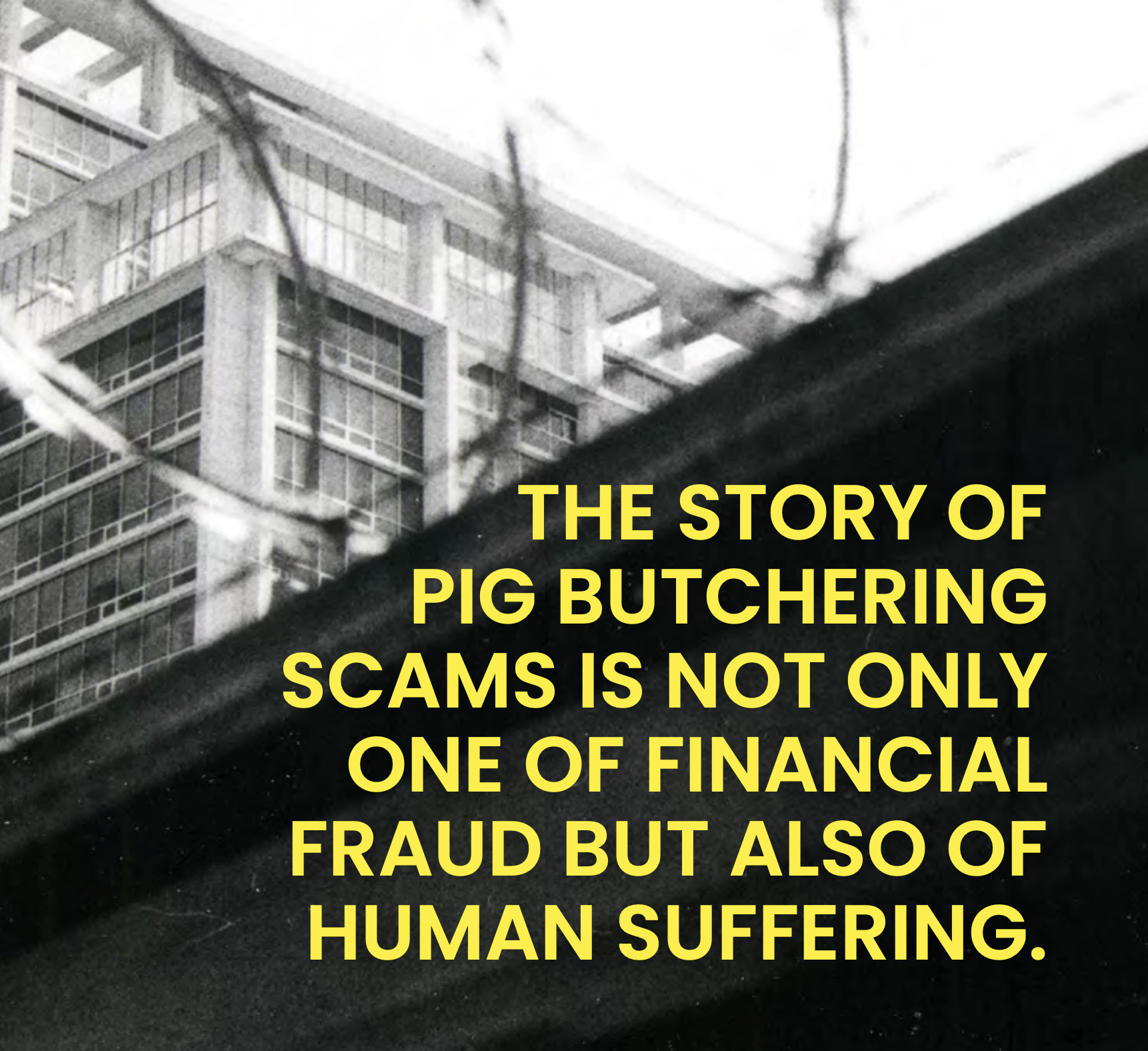Across Saudi Arabia, many growing businesses – from small law firms to local real estate agencies...
Pig Butchering Investment Scams: The Victims On The other Side Of The Bitcoin
Introduction
‘Pig butchering’ is a prolific and rapidly growing cryptocurrency investment scam. It relies on the perpetrator building a trusted, and sometimes romantic, relationship with an individual, leading to a fake investment opportunity and ultimately resulting in the target being scammed out of large sums of money. Methodically planned and meticulously executed, this scam is stealing millions from unsuspecting victims of all ages, professions and nationalities around the world. Reports estimate that British citizens alone lost £97.4 million to this scam in 2023. However, embarrassment and shame experienced in the aftermath of the scam, mean that cases often go unreported, so it is very likely this figure is considerably higher.
Originating in Southeast Asia, the term ‘pig butchering’ does not, in fact, refer to fattening the victim up before committing the scam. It instead describes the process of taking everything possible from them – from the ‘tip of their nose to the end of their tail’. Victims frequently lose their entire life savings before realising what’s happening. Interpol is advocating to change the term to ‘romance-baiting’, as it’s believed the existing stigmatised term maybe deterring people from coming forward to seek help.

Wrong number text
There are several variations of the scam, for example mistaken identity on LinkedIn, or a match on a dating site, or a seemingly wrong number text on WhatsApp. From a simple ‘hi’ on the messaging app, scammers engage targets in casual conversations, investing considerable time building trusted relationships in line with detailed and scripted playbooks. Victims maybe led to believe they’re in a romantic relationship with the scammer who has befriended them. Pretending to be different fake personas to multiple targets, to cast as wide a net as possible, scammers’ personas usually have a glamorous lifestyle, supposedly acquired through successful cryptocurrency investments. Typically, they’re never available to meet in person, inventing a multitude of excuses ranging from having to go into hospital to being posted overseas.
They profess to be able to share their crypto secrets, as taught to them by their uncle or aunt, and begin by asking them to sign up to a legitimate trading platform, such as Binance. This helps gain credibility. Once trust is established, they persuade them to download a fake crypto trading app which is controlled by the scammers, where the latter can manipulate trades, inflate balances, and ultimately extract money.
The scam uses psychological manipulation, often coupled with advanced AI technology, to exploit victims’ trust and vulnerabilities.
Lured by small gains
Initially, their ‘investments’ make a small profit. Once again, this is all part of the process to build trust. Gradually, victims are convinced to invest larger sums of money, enticed by their earnings and encouraged by the close relationship they’ve developed. However, when they want to cash out their investment, they might be told they need a customer account manager’s approval (which never happens), or in some cases, they’re hit with a fabricated tax bill payable before withdrawal. This is one last ditch attempt to take any money they have left.
Pig butchering is an insidious and highly sophisticated fraud having devastating effects on victims and their families. Falling heavily into debtor losing life savings, victims have been known to take their own lives, experience breakdowns, or carry their secret to the grave, feeling too ashamed to admit what’s happened. The scam uses psychological manipulation, often coupled with advanced AI technology, to exploit victims’ trust and vulnerabilities. However, this is just one tragic side of the harmful exploitation taking place.

How ‘pig butchering’ proliferated
Since the early 2000s, Chinese criminal syndicates tied to money laundering and other illicit activity, have been operating large casinos and luxury resorts in unauthorised ‘special economic zones’ in Southeast Asia – for example, along the Thai/Myanmar (also known as Burma) border, Cambodia and Laos. Through agreements with local border militias, the syndicates profited from unregulated casinos in return for land rent. Chinese nationals could gamble without restrictions, unlike in their homeland where gambling has been illegal since 1949 (apart from Macau).
In 2020, many businesses and industries around the globe were suddenly and dramatically impacted by the Covid pandemic. With travel and socialising restricted as lockdowns became widespread, organisations needed to find new ways to continue functioning profitably. From restaurants providing home delivery services, to some commercial airlines switching to cargo-only flights, innovative solutions were needed for businesses to survive. Simultaneously, during this period of economic uncertainty, organised crime rings saw a lucrative opportunity to ramp up scam operations on a previously unimaginable scale.
As international travel bans were put in place, visitors to the “Golden Triangle” region (lawless border zone between Myanmar, Laos and Thailand) stopped practically overnight and, like any business, the syndicates were forced to pivot their operations. Their vacant resorts and empty casinos were converted into scam compounds; with the explicit intention to defraud people worldwide through investment scams, including ‘pig butchering’ scams.
The syndicates redeployed workers from the online gaming and gambling industry, and deceptively recruited tens of thousands of people to staff these compounds. Although Myanmar, Cambodia, and Laos serve as the epicentre of the regional scam industry, nearly every country in the region plays a role in supporting these criminal networks, whether by enabling the trafficking of forced labour into scam centres, providing financial channels for laundering illicit proceeds, or supplying the digital infrastructure that underpins sophisticated gambling, scamming, and financial fraud. Interlinked across borders, scam networks evade crackdowns by shifting operations between compounds. When China closed scam hubs along its border with Myanmar in late 2023, many relocated to Myanmar’s Karen State and across the borders into Cambodia and Laos. The illicit fortunes generated by these scams run out of the region has led to the emergence of many more purpose-built scam centres all over the world - Dubai, Peru, Sri Lanka and even the Isle of Man, a UK Crown Dependency.

It only gets darker
Using fake job advertisements on social media and online recruitment sites, criminal actors lure people with competitive salaries and attractive benefits in listings typically for IT professionals, customer service representatives, models and beauty salon technicians. Travel expenses to the job location along with room and board are also provided. Originally, Asian men in their twenties and thirties were prime targets. Nowadays, however, people from various age groups and social backgrounds all over the world are recruited by traffickers, especially those experiencing financial distress, discrimination and displacement.
the industry grows more sophisticated, demand has expanded to skilled roles in data science, SEO, and digital marketing, sometimes matching real job descriptions but often concealing the location and criminal nature of the work. Others are deceived by friends or relatives, some of whom recruit under coercion or in exchange for their own freedom. In one case in 2022, a 23-year-old was tricked by a friend into what seemed like an air-conditioning job in Thailand but was instead trafficked to a scam compound in Laos. He was only released after his family paid a ransom of US $12,457. Similarly, a young man from Kachin State, Myanmar was lured to Laukkai by a friend, who profited from his recruitment into a cyber scam operation.
Unsuspecting applicants arrive in the foreign country and are transported to the scam compound whereby they have their passports removed on arrival. Typically, their contract is written in both English and Chinese (reflecting links to Chinese OCGs), specifying that they work a 12-14 hour day, with just one day off per week. They learn that pay is linked to recruiting ‘clients’ (victims) and quickly discover that what they thought to be a legitimate job is a scam operation. Using AI to alter their face and voice, and stolen phone numbers and social media platforms to target victims, they’re told to build relationships with their marks to lure funds into fake investments. Without their passports and facing the threat of violence, they have little choice but to comply.

Inhumane working conditions
As for working conditions, scam compounds are typically heavily fortified with gates, guard posts, CCTV, barbed wire, and barred windows; measures designed less to keep intruders out than to prevent workers from escaping.
These self-contained complexes include dormitories where recruits are crowded into bunk-bed rooms under constant surveillance, while managers reside in suites or luxury condos.
Workspaces consist of rows of computers where individuals are forced to run scams for 12 or more hours daily, often at night to match target time zones. Calls are constantly monitored so that workers can’t deviate from the script. Non-compliance or poor performance is punished in isolation cells or “black-out rooms”, frequently involving torture. Accounts from men who previously worked in compounds recount how they were set a target to bring in US $5,000 weekly, otherwise they’d receive two electric shocks.
In one compound, conditions were very unsanitary with only 2 toilets for450 people. A Sri Lankan man who was trafficked in 2023 from Bangkok to Mae Sot in western Thailand and then on to a compound in Myanmar told how he was put in a cell for 16 days for disobeying his captors and only given water mixed with cigarette butts and ash to drink.
Larger compounds feature onsite amenities, such as karaoke bars, restaurants, clinics, and shops, that entrap workers further through exorbitant prices (e.g. US $50 for a painkiller), while exclusive gambling rooms and VIP clubs serve senior managers. Reports of suicides from dormitory balconies underscore the extreme conditions and lack of escape.
People who have previously worked in these compounds talk about a ‘lifecycle of operations’ where workers are moved or sold to different compounds after several months, often under the cover of darkness and byway of several vehicle changes to evade detection. By 2024, United States Institute of Peace (USIP) estimated there to behalf a million people to be allegedly forcibly involved in scam operations across Southeast Asia with people from more than 66 countries having been trafficked to scam compounds in the region.
It can be difficult to see past the scourge pig butchering inflicts on innocent targets when monetary losses are significant and the emotional toll is inconceivable. However, it’s equally important to understand the grim reality behind the people forced to become scammers, with no choice to survive.


What can be done?
Money scammed from victims is not just personal loss. It’s capital for organised crime, fuelling forced labour, corruption and global criminal activity that undermines human rights and international security. To tackle this epidemic effectively, governments must crack down on scam compounds, enforce anti-trafficking laws, and monitor financial flows that fund these operations.
Criminal networks have long exploited the lax requirements of the UK corporate register to create shell companies that lend a veneer of legitimacy to high volume crypto frauds, including pig butchering scams. In 2021, an investigation by the Observer and the Bureau of Investigative Journalism found that global OCGs were using the UK as a virtual base for their operations, with 85 UK-registered companies linked to these scams. By allowing almost anyone to set up a company with minimal checks (for a nominal fee), the system has become a weak link in fraud prevention. However, the UK’s Economic Crime and Corporate Transparency Act 2023 seeks to close that gap by transforming Companies House into an active gatekeeper. Under the transition plan, from autumn 2025 identity verification will become mandatory for new incorporations and new appointments of directors and persons with significant control (PSCs), with a 12-month transition window during which existing officers must verify their identity in their annual confirmation statements. By the end of 2026, the rollout will be complete, including identity verification of existing registrants and heightened scrutiny of limited partnerships and cross-checking with other data sources.
In a significant development in the fight against pig-butchering scams, on the 14th October 2025 U.S. and U.K. authorities seized bitcoin to the value of $14 billion linked to a global fraud operation led by Cambodian businessman Chen Zhi. This unprecedented joint action, which includes the largest civil forfeiture in U.S. history, targets a network that exploited forced labour in Southeast Asia to perpetrate online investment scams. The seized assets are now held in the U.S. Strategic Bitcoin Reserve, marking a shift towards treating illicitly obtained digital currencies as long-term state assets. This coordinated effort underscores a robust, multilateral approach to dismantling complex criminal infrastructures and protecting global investors from sophisticated financial fraud.
Companies and investors need to conduct due diligence to help avoid inadvertently supporting these networks. Intelligence is crucial to equip organisations with the insights they need to navigate high-risk regions, avoid entanglement with scam compounds, and make responsible investment decisions. The story of pig butchering scams is not only one of financial fraud but also of human suffering. Behind every message sent to a victim is often a trafficked individual trapped in a fortified compound, stripped of their freedom, and coerced into exploiting others to survive. Recognising that perpetrator scan be victims too is essential if we are to respond with both justice and compassion. Greater awareness of this exploitation matters, not only to protect potential scam targets but also to disrupt the criminal systems that profit from forced labour and human misery.
.png?width=1160&height=725&name=Are%20you%20confident%20you%20know%20who%20youre%20doing%20business%20with%20(2).png)
How to Commission a Report?
To commission a report, visit www.tathabbat.ai/en/intelligence and submit your request. Whether you’re onboarding a new client, assessing the risk posed by a business partner, or reviewing potential financial crime exposure in your company’s network, Themis’ team will work with you to address your unique requirements and ensure you are taking the necessary steps to protect yourself from liability, losses and reputational damage while saving your business time and money down the line and building trusted relationships in the process.
Request Your Bespoke EDD Report



%20Explained%20When%20and%20Why%20You%20Need%20It.png?height=200&name=TTBT%20Blog%20Enhanced%20Due%20Diligence%20(EDD)%20Explained%20When%20and%20Why%20You%20Need%20It.png)
